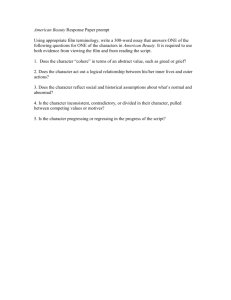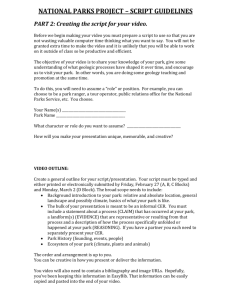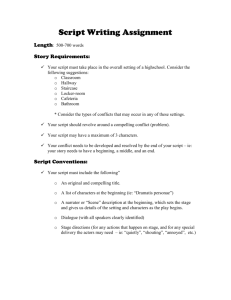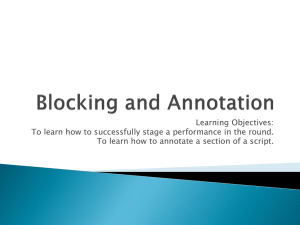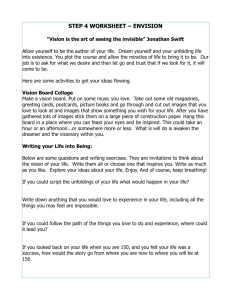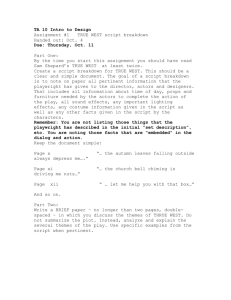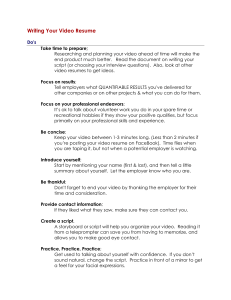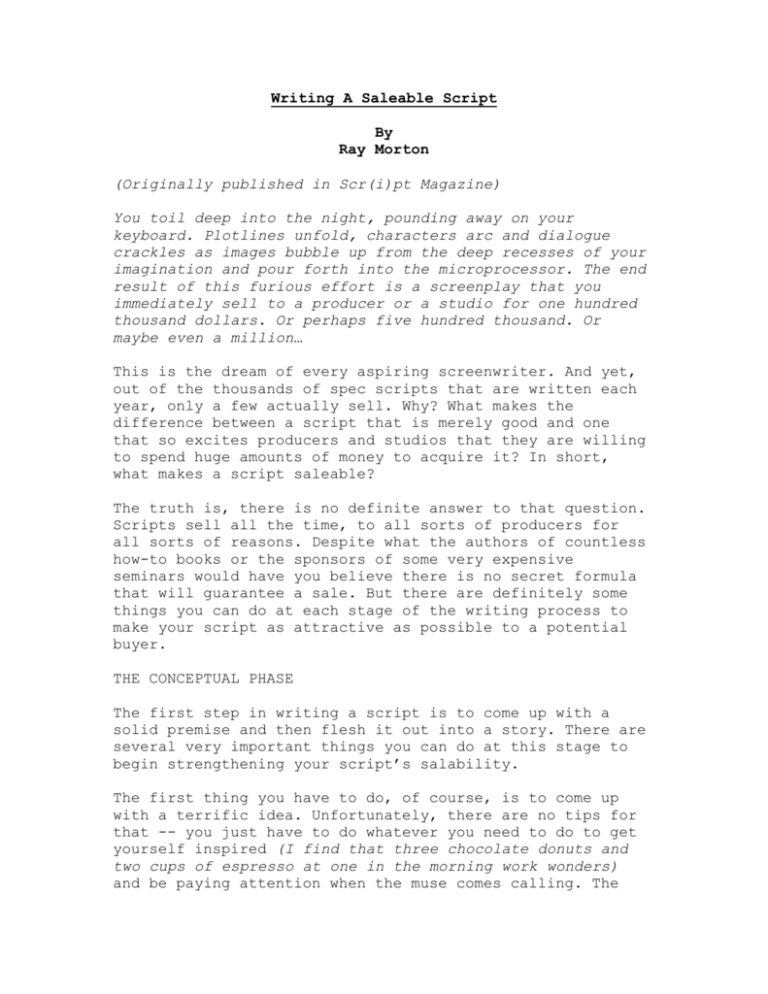
Writing A Saleable Script
By
Ray Morton
(Originally published in Scr(i)pt Magazine)
You toil deep into the night, pounding away on your
keyboard. Plotlines unfold, characters arc and dialogue
crackles as images bubble up from the deep recesses of your
imagination and pour forth into the microprocessor. The end
result of this furious effort is a screenplay that you
immediately sell to a producer or a studio for one hundred
thousand dollars. Or perhaps five hundred thousand. Or
maybe even a million…
This is the dream of every aspiring screenwriter. And yet,
out of the thousands of spec scripts that are written each
year, only a few actually sell. Why? What makes the
difference between a script that is merely good and one
that so excites producers and studios that they are willing
to spend huge amounts of money to acquire it? In short,
what makes a script saleable?
The truth is, there is no definite answer to that question.
Scripts sell all the time, to all sorts of producers for
all sorts of reasons. Despite what the authors of countless
how-to books or the sponsors of some very expensive
seminars would have you believe there is no secret formula
that will guarantee a sale. But there are definitely some
things you can do at each stage of the writing process to
make your script as attractive as possible to a potential
buyer.
THE CONCEPTUAL PHASE
The first step in writing a script is to come up with a
solid premise and then flesh it out into a story. There are
several very important things you can do at this stage to
begin strengthening your script’s salability.
The first thing you have to do, of course, is to come up
with a terrific idea. Unfortunately, there are no tips for
that -- you just have to do whatever you need to do to get
yourself inspired (I find that three chocolate donuts and
two cups of espresso at one in the morning work wonders)
and be paying attention when the muse comes calling. The
only real guideline here is to make sure you choose an idea
you are enthusiastic about. Don’t write something just
because you think it will sell, because that mercenary lack
of passion will come through on every page, killing any
enthusiasm a reader may have for your story. In order for a
producer to buy your script, he has to be excited about it.
And he won’t be excited if you’re not. Passion is
contagious. Without it, it doesn’t matter how good the idea
is – the script will be a dud, both artistically and
commercially.
Once you have an idea, the next step is to determine
exactly what kind of an idea it is. Have you come up with a
high concept thrill ride, a rip-roaring genre story or a
quirky, offbeat indie piece? This step is extremely
important because it will help you to determine the market
you’re writing for and to tailor your script appropriately.
I know, I know… the idea of writing for a specific market
offends a lot of writers. After all, isn’t creativity
supposed to be pure and artistic, unfettered by commercial
considerations? Maybe, but in the spec script universe,
that’s simply not reality. If you’re writing on spec,
you’re writing to sell. In order to sell, there must be a
buyer. And for a buyer to be interested, he has to feel
that your piece will have a chance of succeeding in his
chosen arena. This rule applies equally if the producer is
trying to appeal to a huge mass audience with a commercial
blockbuster or a smaller, more specific audience with an
independent or art house picture. Aiming your script at a
specific market increases your chances of it being produced
and decreases the chances it will end up as just another
coaster beneath a producer’s morning cup of coffee.
Once you’ve determined your market, you need to make sure
that your idea is in a commercially viable genre within
that market. The film business works in cycles. Every so
often a certain type of movie will become popular and
producers will crank out picture after picture in that
style until it becomes exhausted. Other genres then take
over until the process eventually repeats itself. In terms
of salability, it’s important to choose a genre that is
currently on the upswing (so you can ride the first wave)
or perhaps one that has been out of favor for a while (so
that you can reinvigorate it). The worst type to pick is
one that’s been going strong for a while. If you’re seeing
a lot of a certain type of movie in your local theater
lately, you can be certain that there are already hundreds
or even thousands of similar screenplays flooding the spec
market. By the time you finish yours, producers and readers
will be crying out for something different. In the wake of
Reservoir Dogs and Pulp Fiction, so many imitators made the
rounds that more than a few readers contemplated hiring a
squad of loquacious, pop-culture referencing hit men to
take out the authors. We haven’t quite reached that point
with gross-out bodily function comedies just yet, but my
guess is we’re only a pearly drop of hair gel away. So, no
matter how good your idea is, if it’s in a similarly worn
out genre, it’s probably best to let it rest a while.
Once you’ve settled on a market and a genre, it’s a good
idea to take a look at the most successful films from the
arena you’re writing in. Analyze these films and try to
identify the artistic and commercial elements that made
them work (i.e. inventive set pieces for high concept
action movies, self-referential humor in a genre picture,
quirky characters and creative structuring in indie films).
Keep these elements in mind as you develop your story. Use
them if it suits you. Twist or subvert them if it helps.
Don’t get me wrong -– I’m not suggesting that you crank out
some imitative formula piece that does nothing but recycle
cliched old ideas. Freshness and originality are vital.
What I am advising is that you recognize that there are
certain dramatic and commercial elements that propel
certain types of stories to success and allow them to aid
and inspire you as you write.
Another important thing you can do to increase your
script’s salability is to make it castable. Film financing
is dependent on casting. Movies cost a lot and the people
who back them are clearly interested in doing everything
they can to guarantee their investment. Of course, the only
way to do this is to insure that a film will be a hit and
there’s no way to do that (if there was the person who
invented it would be rich beyond the dreams of avarice).
For most of the people who provide the financing for film
production -– studios, distribution companies, banks and
investors -- having an actor with a proven box office track
record in the leading roles is the next best thing. The
theory (and it is just a theory -– The Postman, anyone?) is
that successful stars bring their audiences with them from
film to film, ensuring some sort of guaranteed (high)
return at the box office. Every market has actors it
considers bankable: Tom Hanks and Julia Roberts for
mainstream comedies and dramas, Bruce Willis and Arnold for
action, Parker Posey and Steve Buscemi for indie fare.
Clearly, a script likely to attract these actors is going
to be more interesting to a producer than one that isn’t.
If you keep this in mind as you develop your story and
create characters –- especially lead characters -– that
might appeal to bankable actors, then you’re going to
considerably increase your script’s allure in the
marketplace. The trick here is to not make the role so
specific that it can only be played by one actor. The odds
that one particular performer (especially a big name star
whose schedule is booked years in advance) will be
available and willing to do your script at the exact time
you need him are pretty high. While it’s not unthinkable,
it’s not something you should make your script dependent
on, because if that actor can’t do it, then your script is
sunk. And so is your sale.
THE WRITING PHASE
Once you’ve finished conceptualizing your script, the next
step is to actually write it. This is a crucial phase and
the things you do here will have a big effect on your
screenplay’s commercial future.
One of the most important things you can do is to boost
your script’s salability is to write it well. You will
often hear that screenwriting is more akin to drafting a
construction blueprint than it is to creating great
literature. There is certainly a lot of truth to this,
especially as a script gets close to shooting. Reading a
screenplay at this point can seem more like picking your
way through an incredibly complicated technical manual than
anything resembling a good read. But in the early stages,
when you are trying to interest a producer or a studio in
acquiring your work, it’s important that you write in a way
that will grab your readers. At this point, literary
quality actually counts. Tell your story in an entertaining
way. Imagine you are describing the finished film to
someone who can’t see it. Use exciting, descriptive
language to depict all of the thrills, laughs and tears you
imagine in the piece. Employ language to evoke the emotions
in your readers that you eventually want your viewers to
feel. If you take your readers on a great ride and leave
them feeling like they just have to see this movie, then
you’ll have them reaching for their checkbooks.
A word of caution here: make sure your writing sells your
story and not yourself. Since the arrival of Shane (Lethal
Weapon) Black back in the 80’s, more than a few bad
scriptwriters have adopted a hip, smart-ass style of
writing that is forever commenting on itself. The writer is
constantly stopping the action to remark upon how clever
and cool he thinks what he has written is, to pat himself
on the back for being so cool and clever and to let the
reader know just how awe-inspiring he is supposed to find
all of this coolness and cleverness. Mr. Black invented
this style and does it well. Most other writers do not. In
the wrong hands, it is an obnoxious and tiresome conceit
and will quickly turn off the reader. As well as the buyer.
Write simply, clearly and effectively. Lay out your scenes
in uncomplicated master shots. Don’t include a lot of shot
descriptions, angles or cuts. It’s the director’s job to
visualize the story, not yours. Don’t tell him how to do
his job –- he doesn’t care how you see it and he’s not
going to listen to you anyway. Besides, if you get too
technical, you run the risk of confusing the reader and
causing them to lose track of the plot, which is something
you definitely don’t want to do. Just tell your story,
without embellishment and without distraction. If it’s a
good one, they’ll buy it.
Don’t get cutesy with the structure. In the post-Tarantino
era, spec scriptwriters have been tripping over themselves
trying to find ever more clever, non-linear ways to tell
their stories. When done well and when appropriate to the
story this kind of thing can be interesting. But when done
poorly (which is 99% of the time) and when not appropriate
to the story (also 99% of the time), it can become
convoluted, confusing and at times incomprehensible.
Nobody’s going to buy your script if they can’t understand
it.
Another thing that’s absolutely vital to ensuring your
script’s salability is to make sure that you keep your
focus. Many writers come up with a terrific premise, but,
as they write, they get sidetracked by tangential subplots,
overly colorful supporting characters or superfluous
details and end up neglecting the whole. Some writers who
lack either the ability or the patience to fully develop
their premises actually abandon them after the first act
and start writing an entirely new story with the same
characters. Either way, the original idea gets lost and,
with it, your chances for a sale. Remember, a producer or
studio exec isn’t going to be reading your script cold –he’s going to already have had the premise pitched to him
by an agent, a development exec or the writer himself. If
he’s interested, he’s going to want to read a script that
reflects that premise. If the script doesn’t reflect the
premise, or if it is too hard to find under all the dross,
then the producer or studio exec is going to lose interest
and you’re going to lose a sale.
Related to this idea is another very important point: don’t
be a lazy writer. Do the development on your script
yourself. There is a notion out there –- one promoted by an
awful lot of those How To Write A Script In Thirty Seconds
books and seminars -- that all you need to make a sale is a
good idea and that the script itself doesn’t matter. The
logic here is that, since it’s a fact of Hollywood life
that producers and studios always hire big name writers to
rewrite everything anyway, the only thing that’s really
important in a spec is the idea. As long as that’s solid,
you don’t have to bother developing your story, fleshing
out your characters or polishing your dialogue. All you’ve
got to do is slap together a draft and get it out there.
The appalling lack of professionalism implied by this idea
aside, it’s simply not true. Oh, it might have been a few
years ago at the height of the early 90’s bull spec market,
but in these days of widespread belt-tightening, producers
and studios are no longer interested in developing (in
fact, most companies are seriously downsizing their
development departments. Some are actually eliminating them
entirely). They don’t want to spend a lot of time and money
improving a script. They want to buy something that is preimproved and ready to shoot. So you will greatly increase
your chances of a sale if you perfect your script as much
as possible before you send it out.
Finally, and perhaps most importantly, deliver what you
promise. If your script is supposed to be a comedy, then
make sure it’s funny. If you’re writing a horror picture,
then make sure your readers are jumping out of their seats.
If it’s supposed to be tearjerker, they better be crying
buckets by the time they reach the last page. Why? In a
word –- disappointment. Think about how many times you’ve
seen a movie that’s been advertised as the thrill ride of
the summer or the funniest film of the holiday season or
the most terrifying movie of the long Arbor Day weekend.
Remember how let down you felt when that film wasn’t all
that thrilling or funny or terrifying? Well, producers and
studios are the same way. The only difference is that when
you’re disappointed, you’ve spent eight bucks. When a
producer or studio is disappointed, they’ve saved half a
million. Half a million that’s not going to end up in your
bank account.
THE MARKETING PHASE
Once your script is completed, the next and final step is
to get it out onto the market and into the hands of
potential buyers.
If you’ve been following the advice offered in this
article, you should already have a pretty good idea of the
particular market you’re aiming at. Knowing this, the next
step is to do your homework and find out which producers,
studios and companies work in that market. If you’ve
written a funny boy meets girl story, then you want to get
your script to a producer or company whose forte is
romantic comedy (or at least one that has a varied slate),
not one who specializes in high-octane action pictures. By
all means check out the biggest names, but don’t neglect
the small fry either. The idea is to get your work to as
many people who might have an interest in it as possible.
You never know where a deal will come from.
Having compiled your list, now you have to get your script
to the people on it. While there is a chance that you might
be able to approach smaller, independent companies on your
own, most medium and higher profile companies only accept
scripts submitted through agents. How you get an agent is
beyond the scope of this article, but it’s not a bad idea
initially to approach agents who have some sort of
connection to the companies you’re interested in, either
through a client relationship (i.e. the agent reps the
producer or a writer the producer has used successfully) or
a prior sale. The reason: agents prefer servicing their own
and producers are more receptive to submission from people
they know and trust than they are to cold calls. While it’s
not impossible to get your work to a preferred place
without a connected agent, it certainly helps your chances
if you do have one.
In the last several years, managers have become an
increasingly important factor in the industry. These folks
are not agents, but they do represent writers and submit
scripts to talent, producers and studios. In some
instances, they even produce movies themselves. So you may
find that, rather than initially seeking an agent or trying
to submit to a producer or company, it might be a good idea
to try to get your script to a management company first.
The downside of managers is that most are looking for
projects they can attach themselves to as producers. If
that doesn’t seem likely with your project, they might drop
you faster than Warners dropped Wild Wild West 2. The
upside is that if managers see potential in your script,
they will get the ball rolling quickly and aggressively,
which means a faster and possibly bigger payoff for you.
They will also hook you up with agents, lawyers and all the
other professionals you need to make your deals. Like
production companies, many managers specialize in specific
types of writers and scripts. Again, it behooves you to do
your homework and determine which managers handle the kind
of script you’ve written. It will require a bit of legwork
at the start, but it could pay off quite well in the long
run.
FINIS
I hope these guidelines will prove useful to you. Following
them may not guarantee you a sale, but it will certainly go
a long way in helping you make your script as commercially
attractive as possible in today’s crowded but very
lucrative marketplace. From here, it’s up to you. Good
luck. May there be a million-dollar payday in your future.
And a good movie, too.
Copyright 2000 Ray Morton. All Rights Reserved.

